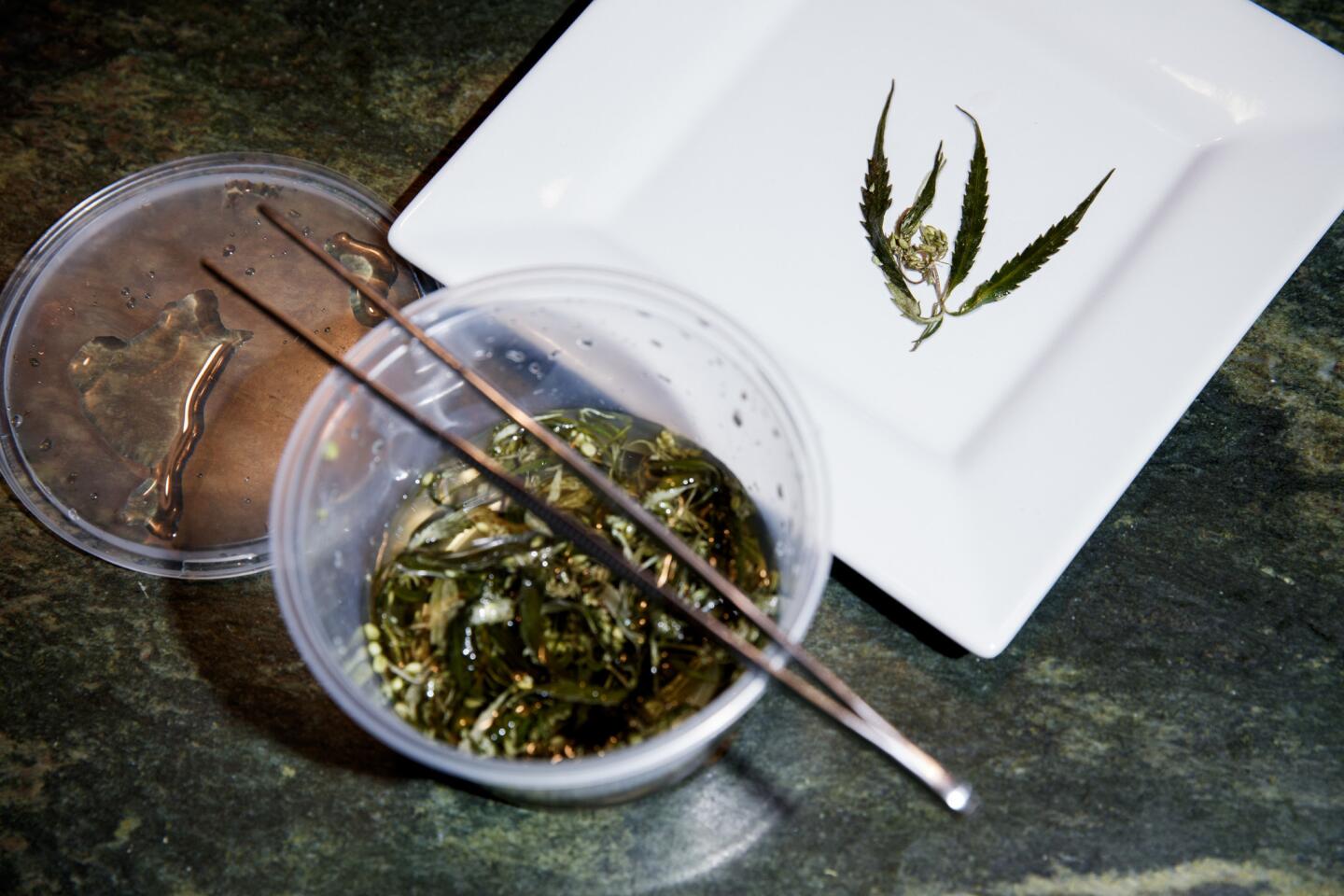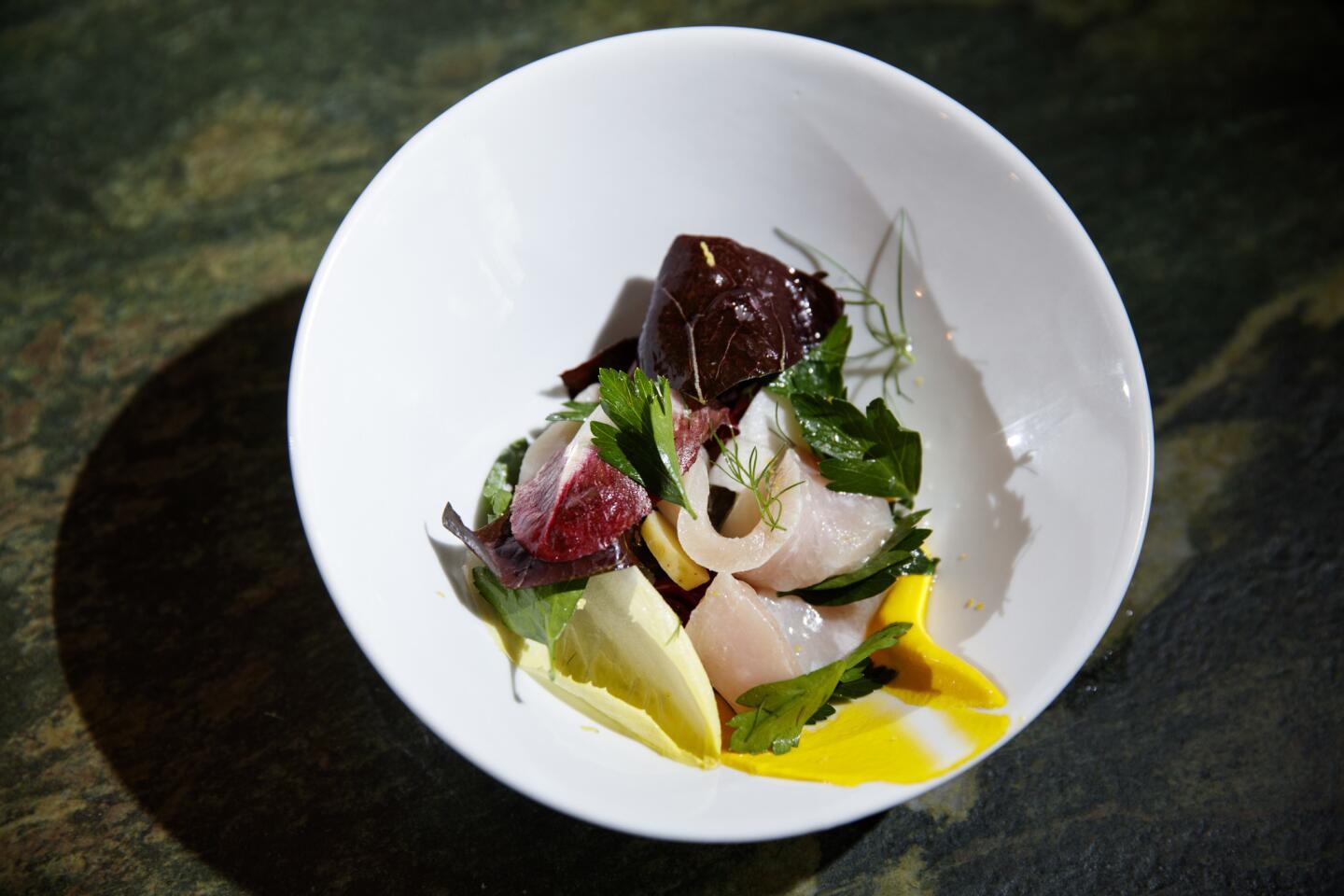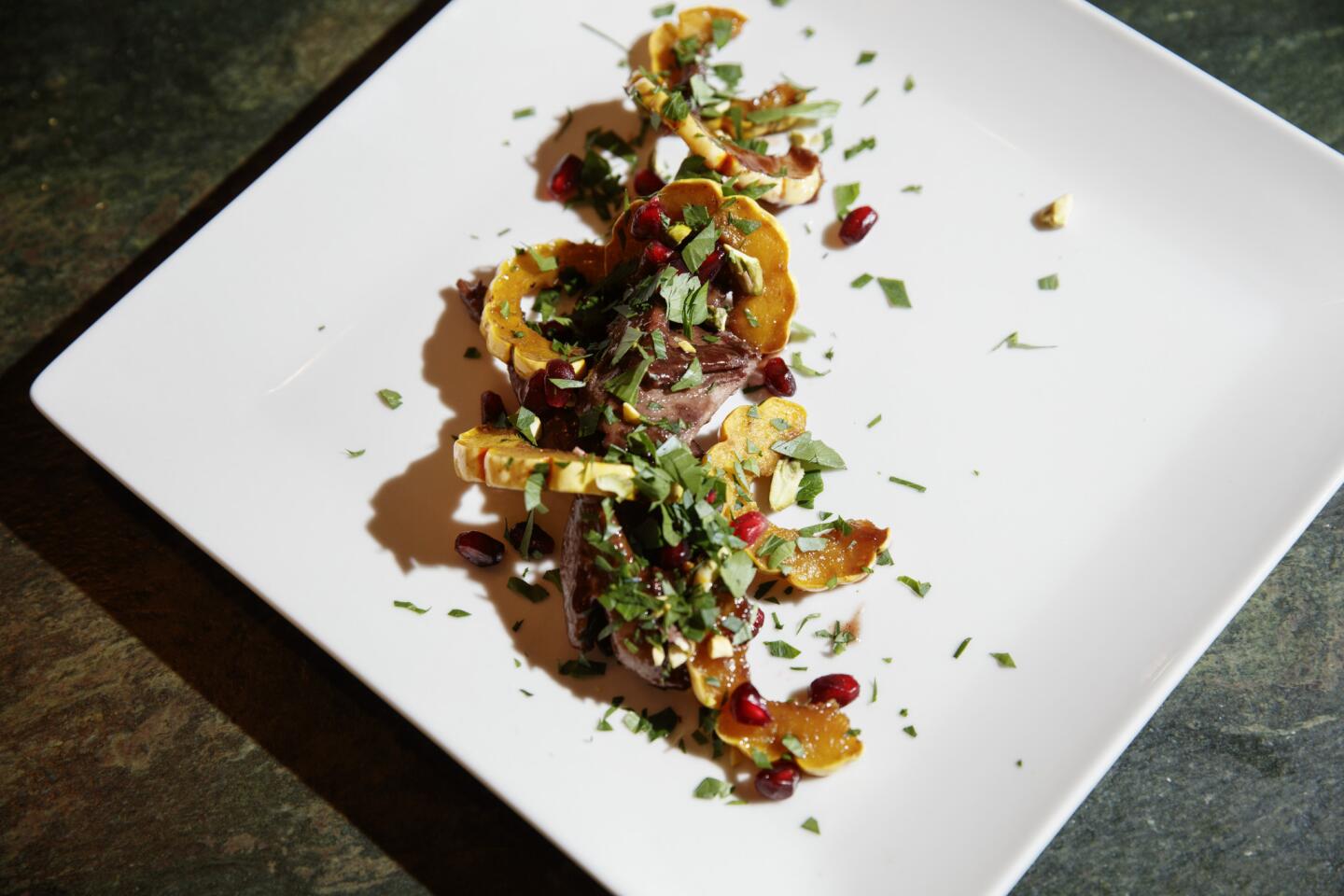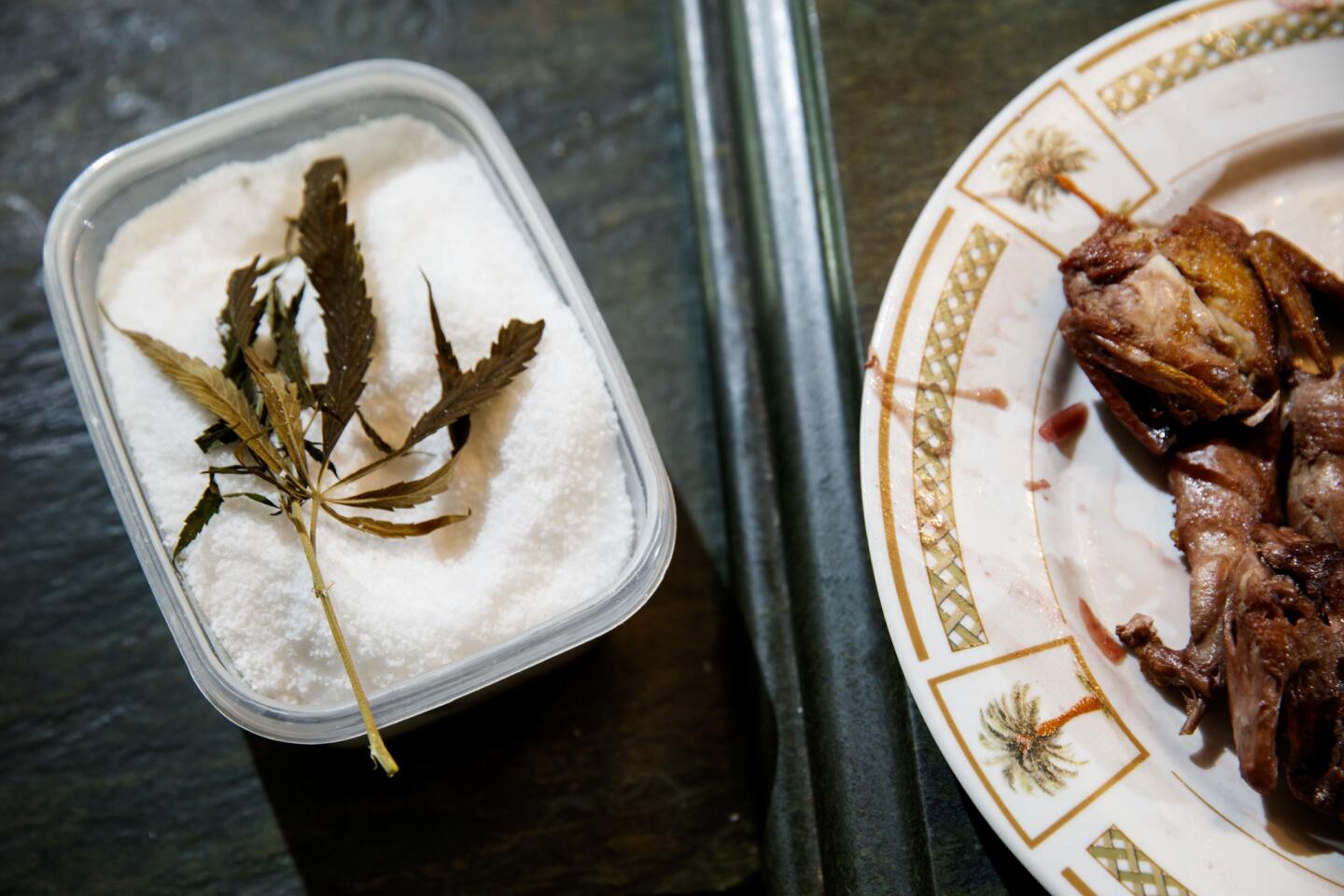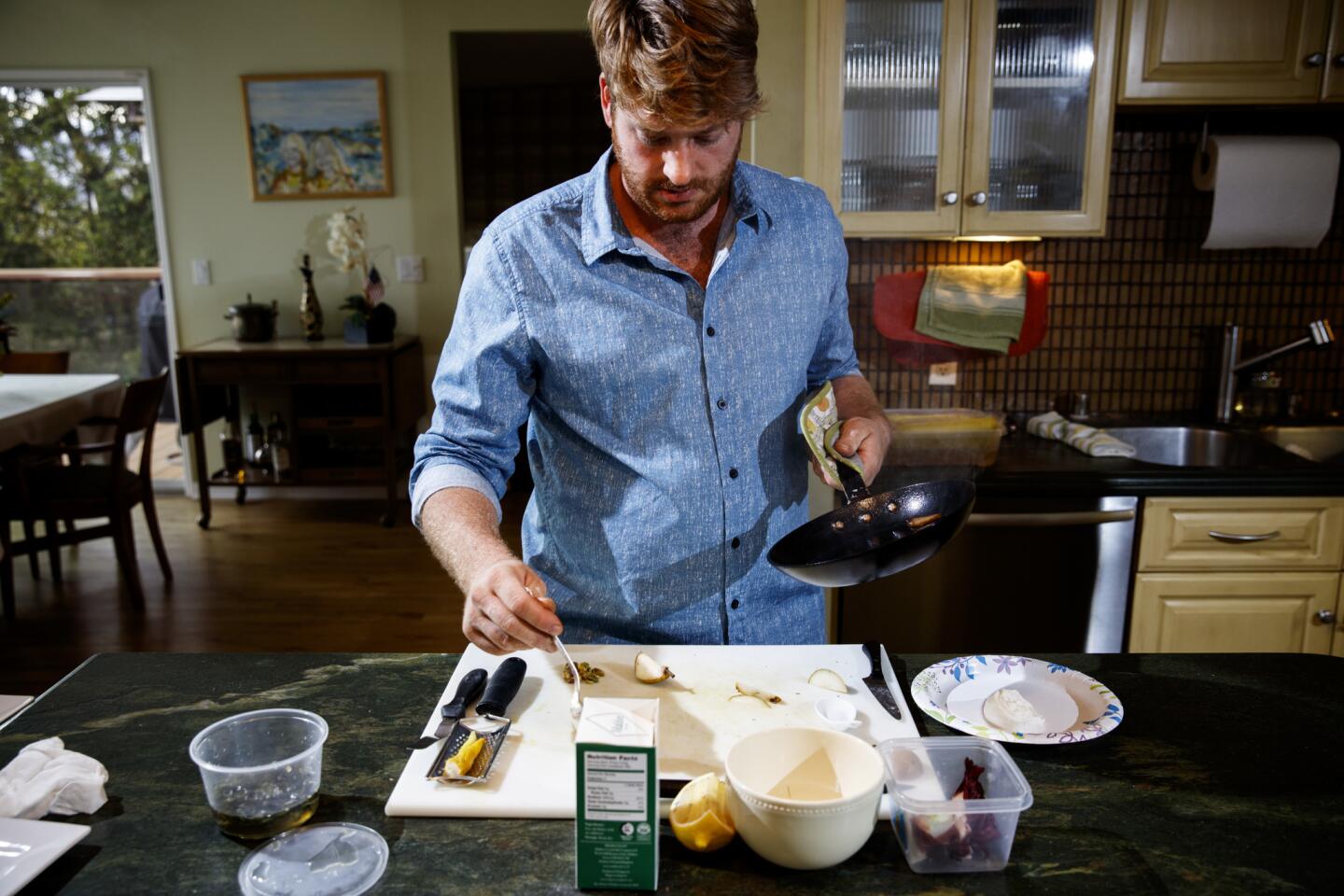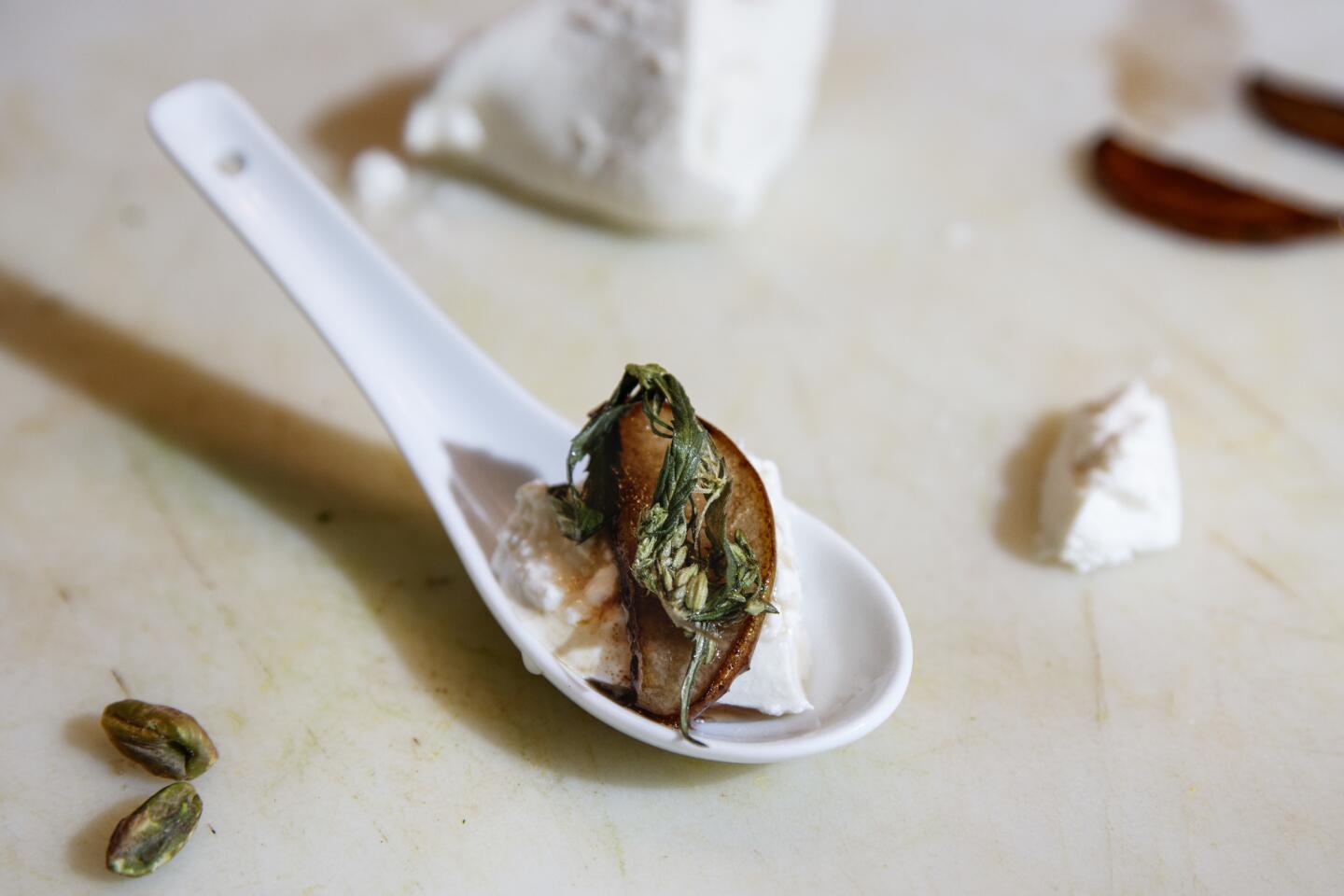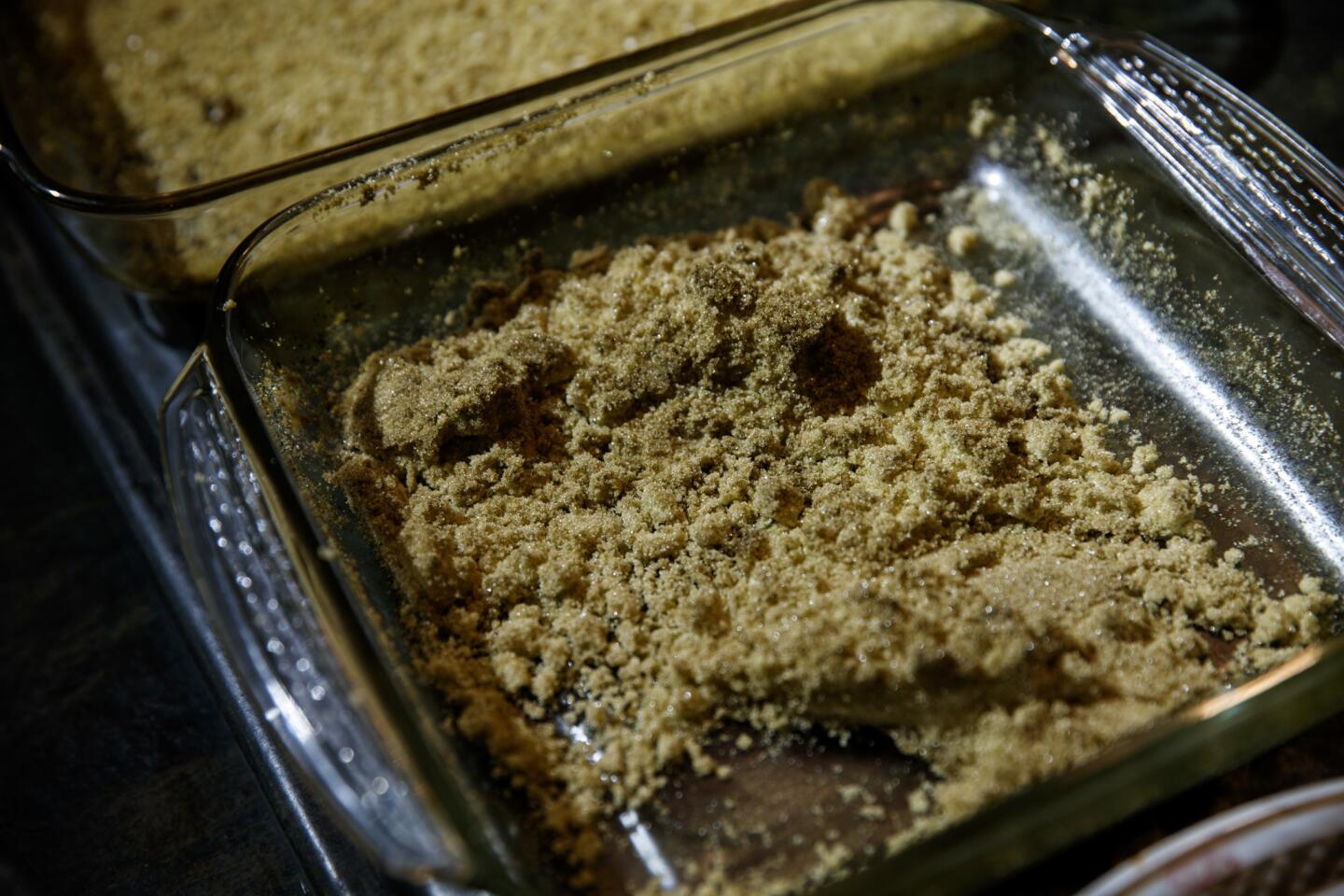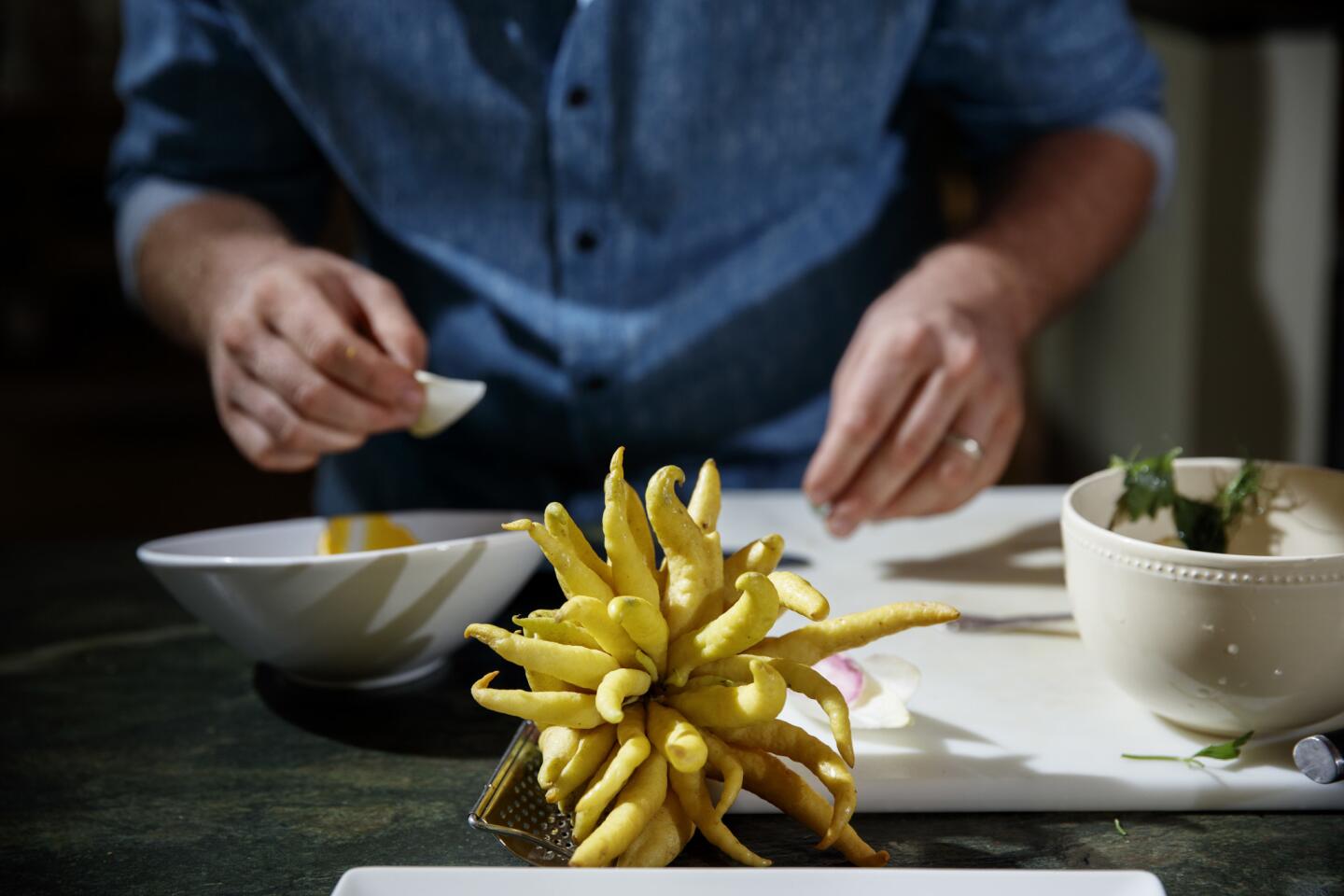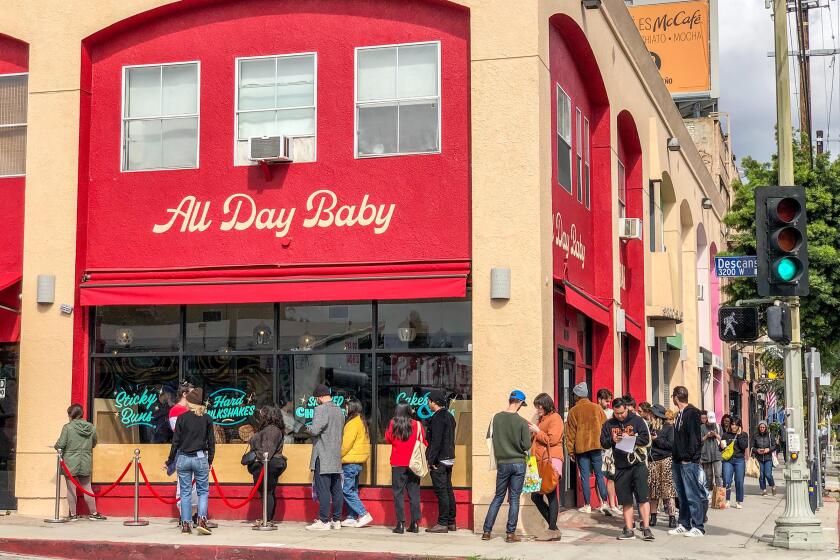A fine dining chef gave up a restaurant career for marijuana-plant-to-table cuisine
“I remember the first time I smoked OG Kush,” chef Holden Jagger says. “I thought it tasted like Mexican food.”
The 32-year-old chef is prepping for a dinner party, perched over the stove browning pears in a cast iron pan slick with duck fat. It’s a familiar task for Jagger, who spent six years — under the name Holden Burkons; he now uses his middle name, Jagger, as his last — working pastry stations under chef Tom Colicchio at Craft and Curtis Stone at Maude, as well as a long stint at Soho House, the members-only celebrity haunt on Sunset Boulevard. The smell of marijuana lingers in the kitchen, left over from cold-smoking shallots with a cannabis variety called In the Pines, which the chef cultivates in his garden partly for its strong notes of citrus, apple and, yes, pine.
The shallots are destined for dinner’s first course of caviar with smoked crème fraîche and pumpernickel shards, and the caramelized pears on the stove will find their way into a cheese course where tiny nuggets of burrata are dressed with a single pickled marijuana leaf that has been salt curing in his pantry since August.
At this marijuana dinner, it’s not the food that will get you stoned. When cannabis appears in a dish, it’s intended solely for flavor, aromatics — and sometimes theater. When those artfully tweezered bites of burrata and pear hit the table, they arrive under a glass dome filled with cannabis smoke. If you’ve ever been on the receiving end of a cloche in a fancy restaurant, you know what happens next: The dome is lifted, a puff of aromatic smoke is dispersed, and dinner is served.
Welcome to the world of bespoke culinary cannabis, where fine dining’s playbook is re-imagined for the moneyed marijuana enthusiast. In Bel-Air dining rooms and Venice gardens, chefs with serious pedigrees are serving multi-course meals where cannabis is either infused or paired with food.
It’s been almost a year since Jagger launched Altered Plates, the name of both his chef-grown cannabis dinners and his forthcoming Web series. A seat at one of his dinners will cost you $500, a price that includes a five-course meal, wine pairings and a pre-rolled joint to go with every dish.
As is customary in luxury dining, at the end of the night guests take home parting gifts from the kitchen, but instead of a pastry, they leave with cannabis-laced caramel corn and custom blended teas that feature a mix of tea and cannabis leaves, and a THC-spiked sugar cube complete with dosing instructions. The dinners, which are smallish — eight to ten guests — are held in private homes.
A weed sommelier is referred to as a ganjier, and Jagger plays this role too. Before a dish of braised quail with pomegranates and delicate squash, he instructs his diners to take a terpene pull, which means inhaling on the unlit joint to experience the aromatic compounds, or terpenes, found in the essential oils of the herb. “This fresh bud almost has a 7-Up quality to it,” he says of the joint, which is rolled with a variety called Wish Mountain, “but at the same time it’s got notes of cherry, toasted nuts and citruses.”
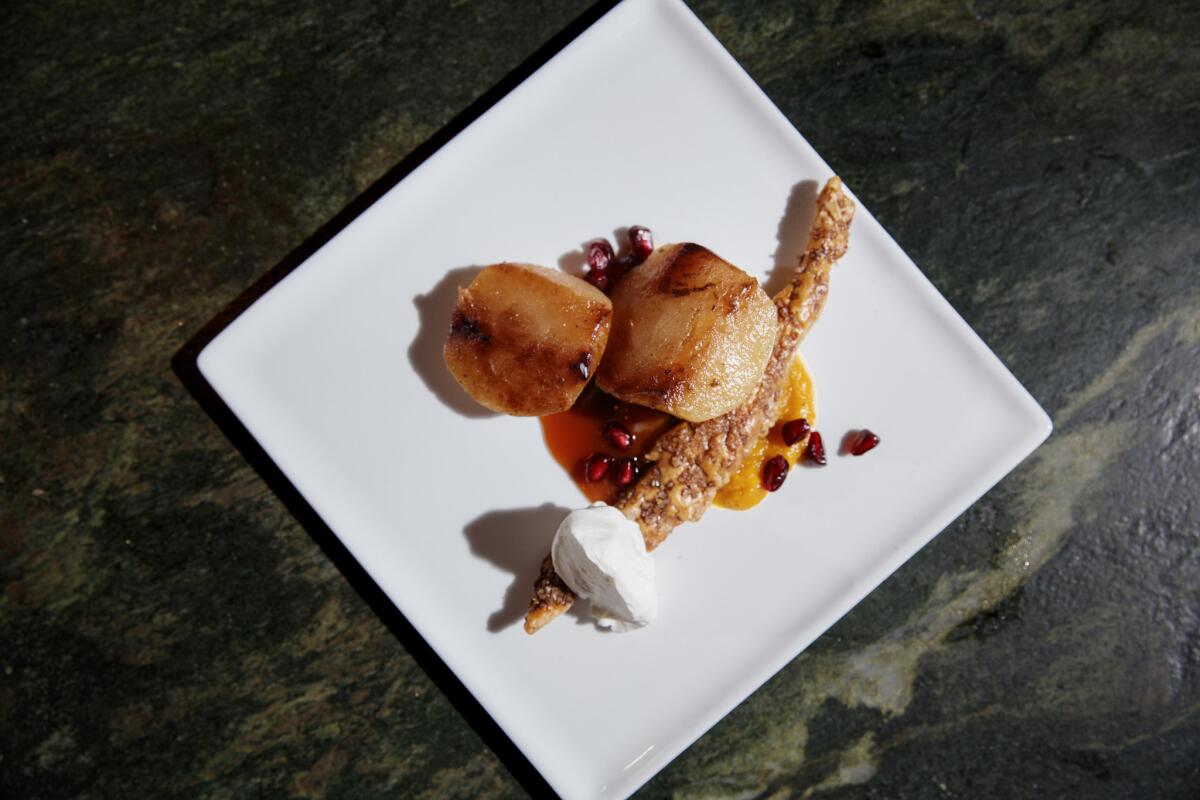
Part of the appeal of Jagger’s dinners is that he is also the farmer, and he’s quick to brand his crop with buzzwords such as “sun-grown,” “organic” and “sustainable.” The logic, of course, is that if you’re the kind of person who shops at farmers markets and gets excited when you see the words Scholium Project on a wine list, you probably want to know where and how your weed is grown. At an Altered Plates dinner you know it comes from a steep, southeast-facing slope in the Santa Monica Mountains, and if you ask, Jagger will tell you about his no-till approach, his custom blend of inoculated soil and the foraged kelp he harvests for his garden beds to keep the worms happy.
Ultimately, Jagger’s goal is to de-stigmatize cannabis by incorporating the plant and its effects into luxury dining, and he’s not alone. In Venice, Aaron Ziegler, who was once executive chef for Wolfgang Puck’s catering arm, hosts seven- to nine-course infused dinners in his backyard under the banner of his culinary events company Bull & Dragon.
Chef Chris Sayegh, a veteran of Mélisse and Providence who calls himself The Herbal Chef, advertises multi-course cannabis events where diners pay $200 to $500 per person for their meal. And Andrea Drummer, an alum of the Ritz-Carlton in Downtown L.A., is hosting cannabis dinners through her collective, Elevation VIP. “This isn’t smoking weed and eating Cheetos,” Ziegler says of the dinners. “It’s a curated experience.”
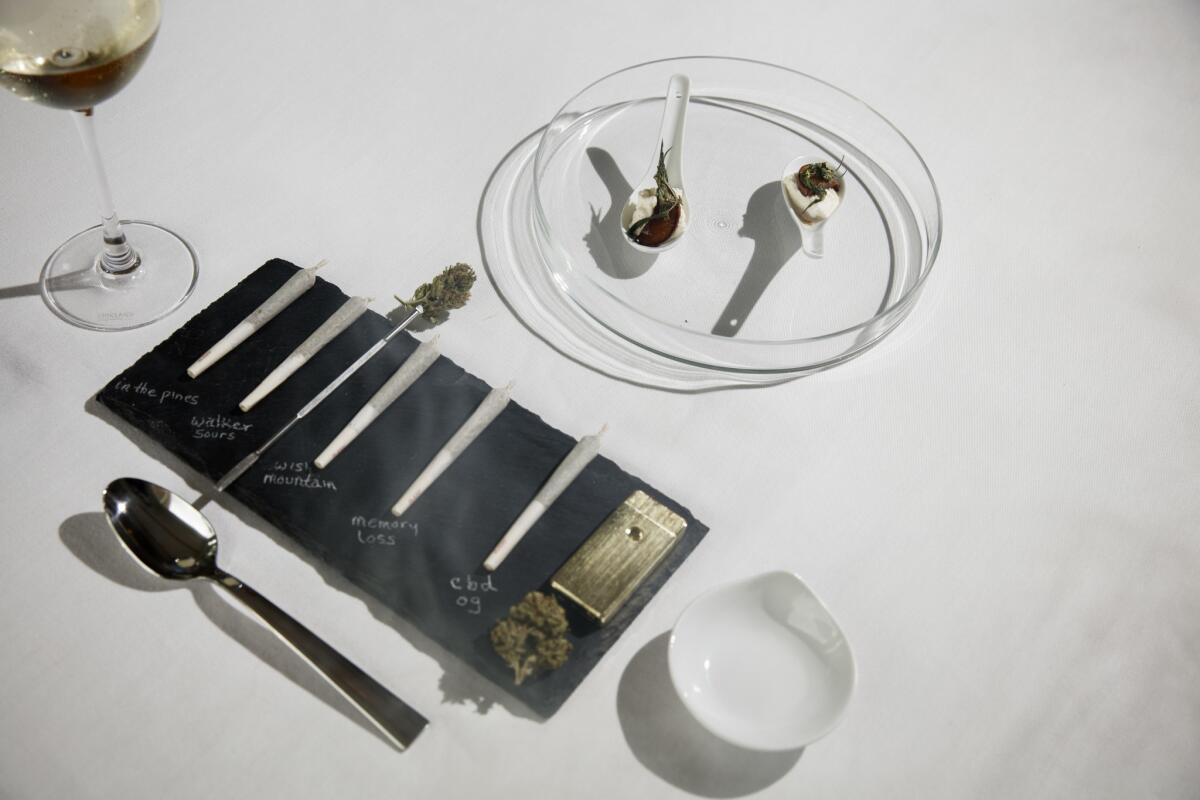
The image of pot brownies and junk food is tough for marijuana users to shake, and no matter how many locavore chefs wave the cannabis flag, the reality is that stoners do love Funyuns and Pop-Tarts, and they are both more accessible and more affordable than hamachi with yuzu and chicories.
But every movement needs a dreamer, and right now Jagger hopes to use his platform to rebrand cannabis as both an ingredient and a socially acceptable inebriant. “If you’re a wine enthusiast, you don’t get called an alcoholic,” he says, “and I’m not a pothead.”
While the city of Denver recently passed a proposition paving the way for social use in bars and restaurants, California’s recently passed Proposition 64 does not allow public consumption — so you won’t be receiving a cannabis menu with your wine list anytime soon. For now, culinary cannabis in Los Angeles will stay behind closed doors, which, let’s face it, is probably part of the appeal.
More to Read
Eat your way across L.A.
Get our weekly Tasting Notes newsletter for reviews, news and more.
You may occasionally receive promotional content from the Los Angeles Times.
